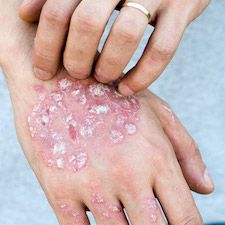Article
Apremilast Monotherapy Effective in Moderate to Severe Plaque Psoriasis
Author(s):
The current registered dosing of the therapy is 30 mg twice daily, but the analyzed dosage of 20 mg has not yet been approved.

A new meta-analysis of apremilast monotherapy found the therapy was effective in patients with moderate to severe plaque psoriasis.
Apremilast was recently approved by the US Food and Drug Administration for the management of plaque psoriasis, which affects up to 1-3% of the global population, and offered to patients who failed first-line systemic therapies.
The current registered dosing of the medication is 30 mg twice daily, but the analyzed dosage of 20 mg has not yet been approved.
Though previous research demonstrated that apremilast significantly reduced the severity of moderate to severe plaque psoriasis, limited data exists on different doses of apremilast and its safety as a monotherapy.
As such, investigators led by Yara E Aljefri, PhD, of King Said bin Abdulaziz University for Health Sciences in Saudi Arabia, evaluated the efficacy and safety of 2 doses of apremilast monotherapy in patients with moderate to severe plaque psoriasis.
Eligibility criteria focused on randomized controlled trials (RCT) that compared apremilast 30 mg BID or 20 mg BID to placebo in adults with chronic plaque psoriasis, which was defined as a PASI score ≥12.
The pre-specified primary outcome was PASI-75, while the pre-specified secondary outcomes were PASI-50, PASI-90, sPGA, and various adverse events.
Trials featuring concurrent use of topical, biological, or conventional systemic therapies were excluded.
Investigators performed systematic search of Medline, Embase, and Cochrane Central Register of Controlled Trials (CENTRAL) databases via Ovid, with the last search being performed on June 11, 2021. From there, data were analyzed via RevMan (Review Manager) version 5.3 in addition to the random effects model.
The initial search yielded 2,582 articles, 892 of which were excluded for being duplicates. Only 8 RCTs were deemed eligible for the meta-analysis.
A total of 2635 treated participants were included in the systematic review, 258 (9.79%) of whom were randomly assigned to receive apremilast 20 mg BID while 1441 (54.69%) received 30 mg BID of apremilast and 937 (35.56%) placebo. The mean age was 48, 46.93, and 46.19, respectively.
Investigators observed that apremilast 30 mg and 20 mg were significantly efficacious in achieving PASI-75 over 16 weeks when compared to placebo (RR=4.60, 95% CI 3.29–6.41 and RR=3.15, 95% CI 1.96–5.07, respectively).
However, only apremilast 30 mg showed a significantly higher rate of adverse events when compared to placebo (RR=1.24, 95% CI 1.16–1.33), whereas apremilast 20 mg did not (RR=1.13, 95% CI 0.91–1.42).
As such, while apremilast 30 mg did result in more improvements than 20 mg in psoriatic plaques, it also caused a significantly greater number of adverse events.
“Most adverse events were mild-to- moderate in severity, with a low discontinuation rate, suggesting apremilast monotherapy to be an effective, safe, and well-tolerated therapeutic alternative,” the team wrote.
The study, "Efficacy and Safety of Apremilast Monotherapy in moderate-to-severe Plaque Psoriasis: A Systematic Review and Meta-analysis," was published online in Dermatologic Therapy.




